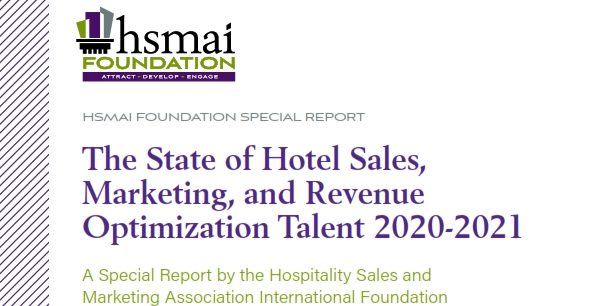By Karen Wollard, Ed. D., CHDM, HSMAI Foundation Research Manager
In the beginning of the pandemic, working remotely had a rocky start, as few companies had infrastructure in place to accommodate this, according to the HSMAI chief human resources officer roundtable discussions in summer 2020. Above-property offices emptied, and companies figured out how to better communicate as each day passed. The initial period of sheltering at home was accompanied by uncertainty, stress, and anxiety. Salespeople scrambled to stay in touch with clients and properties; marketing teams learned new tools and strategies for finding potential guests; and revenue managers struggled with wonky connections to their systems and technology.
 According to McKinsey, prior to the pandemic, 92% of C-suite executives felt that the primary center for work would be the office. That number has dropped to 88% of executives who expect employees in the office at least three days per week. LinkedIn reported that in March 2020, only one in 67 job listings were for remote workers. In November 2021, it was one in six. The McKinsey Global Institute estimates that 20% of global workers could work much of their time away from the office and maintain effectiveness. The most likely candidates are in highly skilled jobs, working with technology that facilitates their efforts. Over 80% of employees report they would like a more flexible working model in the future.
According to McKinsey, prior to the pandemic, 92% of C-suite executives felt that the primary center for work would be the office. That number has dropped to 88% of executives who expect employees in the office at least three days per week. LinkedIn reported that in March 2020, only one in 67 job listings were for remote workers. In November 2021, it was one in six. The McKinsey Global Institute estimates that 20% of global workers could work much of their time away from the office and maintain effectiveness. The most likely candidates are in highly skilled jobs, working with technology that facilitates their efforts. Over 80% of employees report they would like a more flexible working model in the future.
As teams begin to return to the office, hybrid may be the future of work. Working from home has challenged employees and managers alike. Eliminating the commute, saving on office expenses, expanding hiring options, and the ability to maintain productivity make remote work attractive. On the other hand, employees report fatigue and stress, as well as feelings that they’re not part of a team and always at work, as negative aspects of working from home.
In an address at HSMAI ROC Americas in September 2021, economist Adam Sacks discussed the concept of relational equity. When people are together in person, they have a greater opportunity to build goodwill and deepen their relationships. Casual conversations and opportunities to learn more about and from each other help create understanding and collaboration.
When individuals and teams are forced to solely communicate virtually, there are limited opportunities to assist or foster relationships and communication. Remote work tends to reduce the goodwill in relationships. When people are physically together, whether at a conference or in the office, there is opportunity to build equity for the future. Teamwork and camaraderie must be reimagined and reinstated, perhaps in new ways, to help rebuild and strengthen reorganized work groups.
There are good reasons that companies would like their teams, especially their commercial teams, back in the office. The need for sales, marketing, and revenue optimization collaboration is as great as ever, and the volatility of markets and COVID-19 variants continues to create uncertainty when booking future business. Agile teams looking at the same data and information together can react quickly to client requests. There is still hope that “normal” is right around the corner.
When it comes to remote work, a lot of questions have remained: Who gets to work remotely and for how many days? How will teams work together? What collaboration and communication tools will be effective? How will productivity be measured? What are the policies for pay, promotions, attendance, behaviors, evaluation, and reporting? Who will monitor the selected measurements? The list goes on, as attendees at the October 2021 HSMAI Sales Leader Forum discussed.
Some teams will remain remote but will connect in person more often. This could be a potential business opportunity for hotels, facilitating the ability for organizational teams to meet and spend quality time together. While some larger team meetings may seem more like small conferences, the difference is that these teams are working together virtually most of the time. These are people they email or videoconference almost every day. Teamwork and camaraderie are requirements for when the team assembles in person. The idea is not to simply continue the business of the company, it is to recharge relationships so that cooperation, communication, and collaboration are facilitated and strengthened.
This is an excerpt from the HSMAI Foundation’s State of Hotel Sales, Marketing, and Revenue Optimization Talent: 2020-2021 special report. To learn more about the HSMAI Foundation and its mission, visit the Foundation website.
